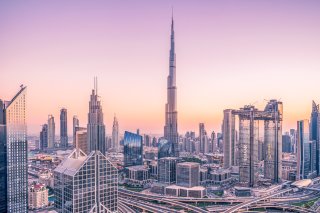COP28 Signifies a Changing of the Guard in the Middle East
The Arab Spring that erupted in 2010 marked the end of the era of Egyptian hegemony and the beginning of a shift in power—now completed—towards the region’s smaller, wealthier, and more progressive countries like the UAE.
The United Nation’s annual climate change conference, COP28, is set to be hosted by the United Arab Emirates (UAE) this November, succeeding the previous host, Egypt. Amid the discourse surrounding COP28 an important perspective has been absent: that of the Middle East. Though the decision to transition COP hosting responsibilities from Egypt to the UAE was made by the Asia Pacific group of nations, it encapsulates the shift in power dynamics within the Middle East over the past two decades. Egypt, which led the Arab world during the twentieth century, has handed over the reins to a new regional force that seeks to spread its vision: the UAE.
It was Egypt’s leaders who championed Arab unity in the twentieth century, popularised socialist economic ideas, and pioneered peace talks with Israel. The Arab Spring that erupted in 2010 marked the end of the era of Egyptian hegemony and the beginning of a shift in power towards the region’s smaller, wealthier, and more progressive countries like the UAE. Abu Dhabi advocated models for a diversified economy that would not rely solely on natural resources, for leadership that would speak to all actors in the region—including Israel— as well as for a society looking to embrace progress alongside conservatism, prosperity-based nationalism, cultural pride, and most importantly, religious and social tolerance.
Now, the UAE needs to show its strength in leading policy and action on climate change, perhaps the gravest threat facing the world today. Indeed, for the UAE this is not a theoretical discussion. Contrary to popular belief, the Middle East faces a more immediate impact from climate change than the West. Desertification, food scarcity, migration, rising sea levels, and the stark difference in life expectancy between the Middle East (71) and the West (78.9) underline the urgency. The UAE, positioning itself as a regional and global leader, holds significant stakes in ensuring COP28's success.
In recent years, the UAE has demonstrated its commitment to adopting and implementing the highest international standards. It ranked first in the Pandemic Resilience Index’s ranking of governmental responses to coronavirus in 2022. On the economic front, Abu Dhabi worked to effectively streamline its government ministries and stimulate job growth in the private sector, an effort that saw the 29,810 Emiratis working in the private sector in 2021 almost triple to 79,000 in 2023. In 2022, it also shifted to a Saturday-Sunday weekend to align its economy with that of the global market. The UAE’s pragmatic approach is yielding results. Domestically, as part of its effort to ensure its competitiveness and future development it has undergone significant human rights reforms including offering naturalization to foreign workers and introducing civil marriage for non-Muslims. Regionally, it has been investing extensively in Africa, is supporting Egypt economically, and was active in search and rescue efforts following the recent earthquake in Syria and Turkey.
These strategic changes reflect the UAE's dedication to progress, a vision inherited from its founders. The global competition for talent and an innovative economy means that the UAE must adapt quickly, and the upcoming COP28 conference in Dubai, therefore, represents a meaningful opportunity. It is an expression of the country’s effort to adapt to global changes and become a model of a thriving Arab economy that meets the highest international standards. Despite its role in the traditional energy market, the UAE wishes to lead the global climate agenda including emissions reduction. This is reflected in the action plan that the UAE presented in Brussels in July 2023, as well as in its domestic policies including, for example, the efforts of the construction industry—especially in Dubai—in recent years to increase investment in smart construction techniques that focus on reducing energy consumption.
For a global action plan on climate change to succeed, effective cooperation with the regional leaders of today and tomorrow is critical. In the Middle East, pioneers persuading their neighbors to make courageous reforms—from flexibility in interpreting Islamic law to the adoption of international standards on matters of individual rights including the status of women and integration of foreigners – are likely to have substantial influence on climate as well.
The appointment of Dr. Sultan Ahmed Al-Jaber—the CEO of the Abu Dhabi National Oil Company (ADNOC) as well as the chairman of the (very active but much less discussed) Abu Dhabi Future Energy Company (Masdar), the UAE’s renewable energy company—as the COP28 president epitomizes the UAE’s result-oriented approach towards effectively diversifying their economy.
Senior Emirati executives are steering the region towards sustainable futures. Their intimate knowledge of the elements shaping the country and the region means that they have a better chance of successfully impacting real change.
The UAE-led COP28 is an important opportunity to shape the Middle East’s perceptions and policies towards climate change, a phenomenon that is already severely impacting lives in the region.
Yossi Mann is head of the Israel and Arab Gulf program at the Abba Eban Institute and head of the Middle East Program at Reichman University in Herzliya, Israel.
Image: Shutterstock.

